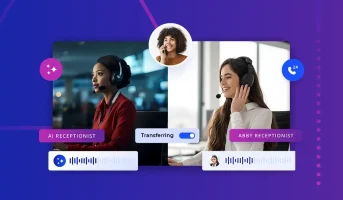Knowing how to empathize with a customer, especially a frustrated one is an incredibly important skill in customer service. Acknowledging a customer’s feelings, and seeing the world from their perspective, puts you in a better position to improve their experience. Remember, your business is built on happy customers, and empathy should be a part of every step of the process—from product design to marketing to customer service.
You may not always agree with the customer completely but showing empathy in customer service builds loyalty and reflects your willingness to help. As a business owner, how do you use empathy to soothe an irate customer?
What is Empathy?
Customer complaints often come from feeling misunderstood, misled, or not listened to. Empathy is the ability to understand the customer and share their feelings. In customer service, empathy allows business owners and employees to recognize a customer’s perspective and understand their problem. This results in a genuine interest in improving their situation.
For example, if a customer comes to you complaining that there’s a bug in their software and they can’t access something they need, your first instinct may be to assume they’re doing something wrong. And maybe they are. But if you put yourself in their shoes you can recognize why they would make that mistake. Is the next step in the process unclear? Is it hard to find the button? Is the content hard to understand? Empathy allows you to better understand them, why they do what they do, and react positively. Plus, at the end of the day, you may get some valuable insights that can help improve experiences for other customers.
Empathy also requires business owners to show curiosity when it comes to understanding the caller, their situation, why they’re really mad and yelling at you, why they are frustrated, and what the call really means to them. Instead of blaming the customer or acting uncaring, you discover and solve the problem together. Temporarily, you and the customer are a team.
How to Handle Irate CX with Empathy
How to Recognize an Irate Customer
Anger and frustration are normal human emotions and it’s important to recognize and acknowledge when a customer is feeling this way. You can recognize an irate customer in how they talk, what they say, and how fast they say it. Upset callers tend to talk faster and louder. They may talk over you, yell, or sigh. The way they express their frustration may vary, as people handle anger in a multitude of ways. As you build your proficiency with empathy, you’ll get increasingly better at recognizing the signs and soothing customers early in the call—circumventing the yelling entirely (though this, of course, isn’t always possible).
Chances are, you’ve met an angry person in your life. Customer service is no different. But, you don’t have to write them off just because they’re angry. In fact, frustrating customer experiences that are handled well go a long way toward building real customer loyalty.
How to Empathize with an Irate Customer
1) Make Feel Heard and Listened to
Patience is key. Don’t interrupt your caller just because they’re angry. Instead, let them vent their frustration before you get down to business solving their problem. Most people have had a bad experience with a customer service representative in the past, so there’s a chance they’re bracing for a fight. The easiest way to show empathy in customer service is to simply not fight. Listen to them patiently, hear them out, and then commit to helping them find a solution.
Try some of these empathy statements for angry customers
“I can certainly understand why you’re frustrated…”
“I’m sorry you’re having this problem…”
“I’m truly sorry to hear about your experience”
These particular empathy statements aren’t about solving their problem, you’ll do that later. Instead, these are about showing the customer that you understand they’re having a hard time, you understand why, and you care to help them find a solution.
2) De-escalate the Situation
When you meet fire with fire, everything burns. The same can be said for anger. If you react angrily to an angry customer, nothing is solved and everyone is upset. Before you can solve their problem, you need to calm them.
If the first step is making them feel heard, the second is getting them to step back and take a breath.
Try some de-escalating empathy statements like
“Thank you for taking the time to share the details of your experience”
“I will do everything in my power to fix this for you”
As they tell their story, pose follow-up questions and sprinkle in some de-escalation. If your customer feels like you care, they’ll calm down more quickly than you might expect.
3) Show Genuine Concern About Solving the Problem
You’ve apologized for the situation and empathized with the customer, it’s time to get down to business. If the problem can be solved on the phone, solve it as efficiently as possible. Solving their problem quickly can go a long way towards making them feel like you care and you’re putting in the effort. Ask for their email address so you can send them a personal follow-up to ensure everything is running smoothly the next day or next week. If they feel a personal connection with you, they’ll feel a personal connection with the brand.
Unfortunately, not every problem can be solved at the moment. It may require higher-level access than you have, an additional team member, or it may even be a genuine bug in the system or a flaw in a process. If this is the case, you need to make sure your customer doesn’t feel like you’re just trying to get them off the phone. Always promise them you’ll follow-up and then actually do some.
Here are some more empathy statements for angry customers:
“Let me escalate this for you. I want to make sure my team prioritizes fixing this.”
“I’ll get back to you as soon as possible.”
“I’m going to send you a follow-up email with a summary of our conversation and next steps right after this call. Here is my personal phone number so you can reach me directly if the problem persists.”
4) End with Empathy
Acknowledging how your customer feels isn’t just for calming them. It’s a process that threads through your entire conversation. Empathy is as important at the end of the calls as it is at the beginning. End your call with an angry customer by assuring them that you care about their experience and you want them to continue to have a good experience.
Here are some closing empathy statements for your angry callers:
“I’m so glad we were able to get that fixed for you. In my follow up to this call I’m going to give you my direct line so you can reach me directly if this happens again.”
“Thank you for taking the time to share your feedback. I’m going to take this back to the team.”
“I really appreciate your patience. Please let us know if you have any more questions.”
“Is there anything else I can help you with today?”
How to Show Empathy in Customer Service
Empathy isn’t just a phrase and how you say it. It’s the process of understanding your customers and being available to help them when they need it. You should be training your team on how to empathize with a customer and regularly spot-checking to ensure consistent experiences. You could create conversation templates or even script empathy statements for angry customer. But, most importantly, you have to actually care about their experiences. They’ll know if you don’t.
At Abby Connect we know a lot about empathy. Our highly-trained receptionists go through regular training and are experienced with de-escalation. They know how to show empathy in customer service, no matter how angry the caller.
If you’re looking for an expert receptionist team to answer, transfer, take messages, and schedule appointments, you’ve come to the right place. Our customers get 100% live call answering from real receptionists, who are assisted by A.I. technology so they can be super-human.





